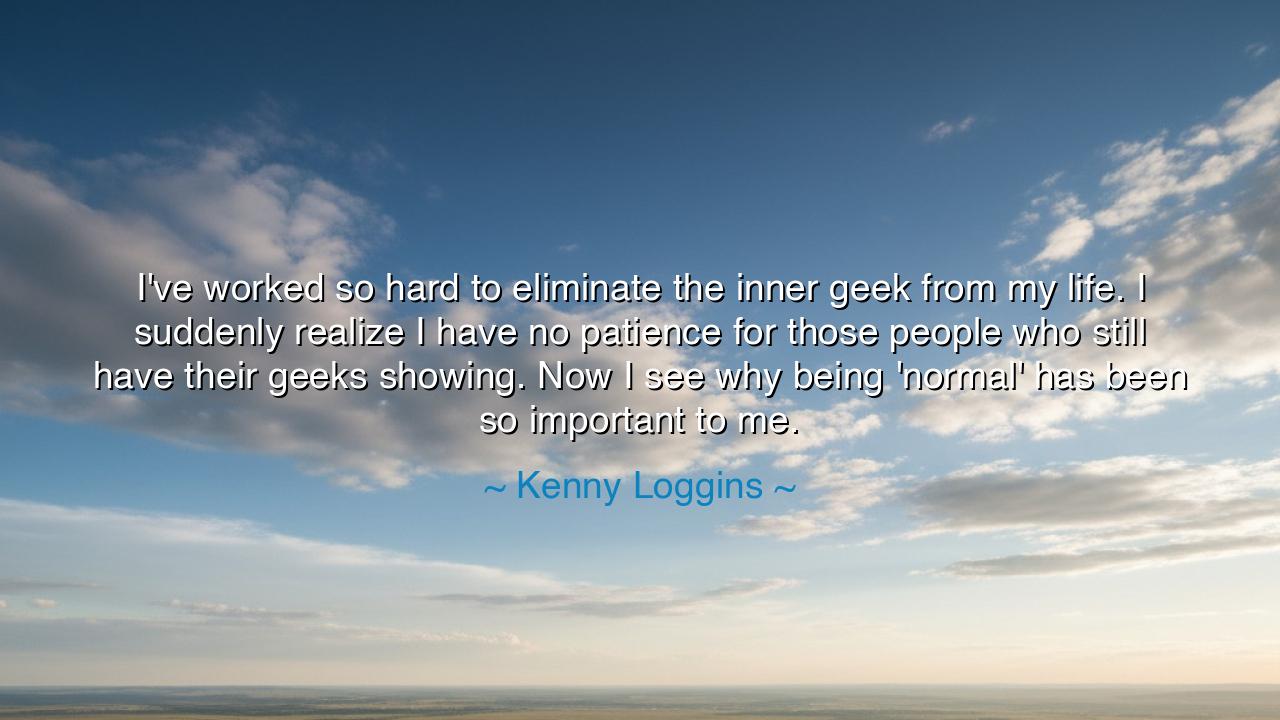
I've worked so hard to eliminate the inner geek from my life. I
I've worked so hard to eliminate the inner geek from my life. I suddenly realize I have no patience for those people who still have their geeks showing. Now I see why being 'normal' has been so important to me.






Hear, O seekers of identity and belonging, the words of Kenny Loggins, who confessed with candor and vulnerability: “I've worked so hard to eliminate the inner geek from my life. I suddenly realize I have no patience for those people who still have their geeks showing. Now I see why being 'normal' has been so important to me.” These words, clothed in humor yet weighted with truth, reveal the ancient struggle between the self we are born with and the self we believe the world demands of us. It is the battle between authenticity and conformity, between the inner geek and the mask of normality.
For what is the inner geek, if not the raw, unpolished self—the part of us that delights in passion, in curiosity, in obsessions others might mock? It is the unguarded child who cares less for judgment and more for wonder. Yet Loggins speaks of suppressing it, of laboring to bury it, of striving instead for the cloak of “normal.” Why? Because the world, ever harsh, often shames difference, demanding that all march to the same rhythm. To be “normal” is to be safe; to be different is to risk ridicule. His words shine a light on the painful truth: many of us exile parts of ourselves to gain acceptance.
Consider, O listener, the story of Galileo Galilei. He was mocked, ridiculed, and even condemned for his “geekish” obsession with the stars and his refusal to bow to accepted beliefs. His passions set him apart, making him “abnormal” in his time. Yet his courage to embrace that inner passion changed the world’s understanding of the heavens. Had Galileo cast aside his inner geek for the safety of conformity, the light of his discoveries would have been extinguished. Thus history reveals that the very qualities mocked in one age may be celebrated in another.
Loggins’ words also uncover the irony of this struggle: in rejecting the inner geek in ourselves, we often grow impatient or even hostile toward it in others. He admits to having no patience for those who still wear their passions openly, for they remind him of the self he worked so hard to suppress. This is the danger of denying our true nature—when we silence our authenticity, we may grow bitter toward those who still dare to live it.
And yet, beneath his confession lies a longing. Why else would he reflect on this journey if not to reveal its hollowness? For to be “normal” may shield one from judgment, but it also robs life of its color. The inner geek, the spark of individuality, is not weakness but strength—it is the seed of creativity, innovation, and joy. A society where all suppress their uniqueness becomes stagnant; a life lived only to appear normal becomes empty.
What lesson, then, shall we take from these words? That while the desire to belong is powerful, it must never come at the cost of silencing the truest parts of ourselves. Let us not exile the inner geek, but embrace it as a source of passion and originality. Let us be patient with others in their quirks and eccentricities, for they remind us of the courage it takes to live authentically.
Therefore, O child of tomorrow, learn from Loggins’ reflection: do not bury the light of your uniqueness in the soil of conformity. Cherish your passions, however strange they may seem, and honor them in others. Seek balance—learn to walk among society without surrendering your soul. For it is not “normality” that brings meaning, but authenticity. And in the end, the world is moved not by the normal, but by those who dare to let their inner geek shine.






AAdministratorAdministrator
Welcome, honored guests. Please leave a comment, we will respond soon